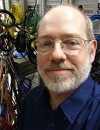Prof. Henry Gordon Dietz
Individual Member |
Professor
at Univ. of Kentucky
|

|
|
|
|
Contact Details:
|
Sign In to send a private message or view contact details
|
|
I am best known for my work in high performance computing, largely using commodity hardware. I and my group (Aggregate.Org) built the world's first linux cluster supercomputer, authored the LDP Parallel Processing HOWTO, created the base technology for SWAR (SIMD Within A Register), co-developed Warewulf, invented FNNs (Flat Neighborhood Networks), etc. We have set a number of world records in supercomputer price/performance, and have been recognized by Gordon Bell and Computerworld Smithsonian awards.
We built our first linux cluster video walls in 1994, and had a 30MP wall by 1996 -- which inspired us to start working on making commodity cameras and digital imaging devices up to the challenge. I actually had done commercial photography professionally as an undergrad, so most of our work is combining understanding of photography with computer engineering, tweaking all the pieces to work better together. Current work includes many projects involving out-of-focus PSF, various "camera hacks," and a new type of imaging sensor. It is only since 2012 that I have been publishing this work in IS&T/SPIE venues.
Upcoming Presentations
Most Recent |
Show All
|
Retrieving Data, please wait...
Publications
Most Recent |
Show All
|
Retrieving Data, please wait...
Conference Committee Involvement
Most Recent |
Show All
|
Retrieving Data, please wait...
Course Instructor
Most Recent |
Show All
|
Retrieving Data, please wait...
|

